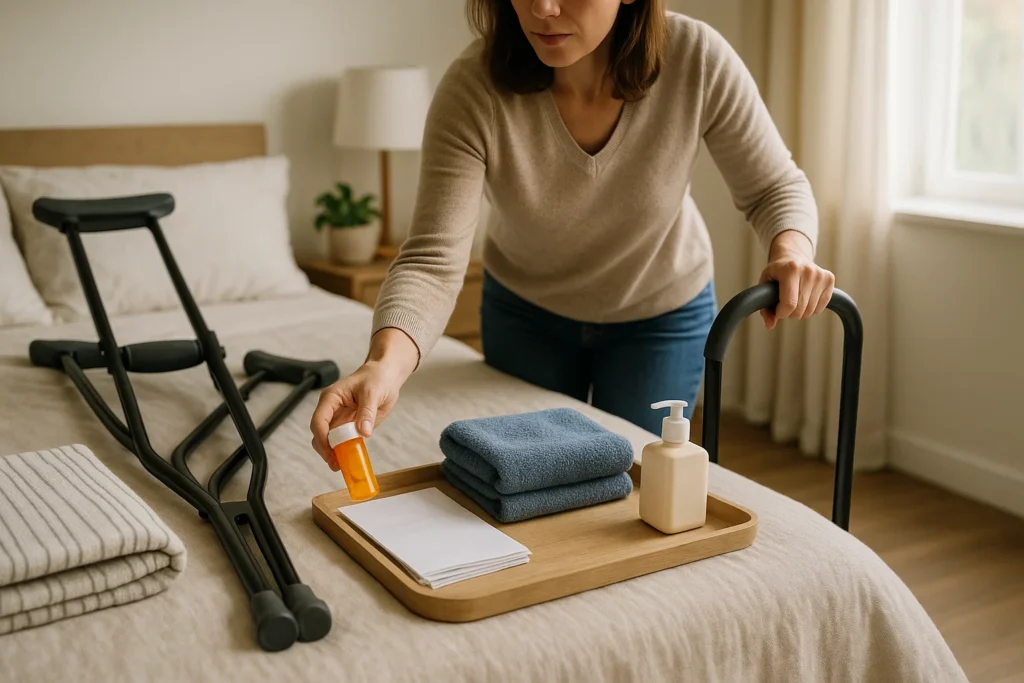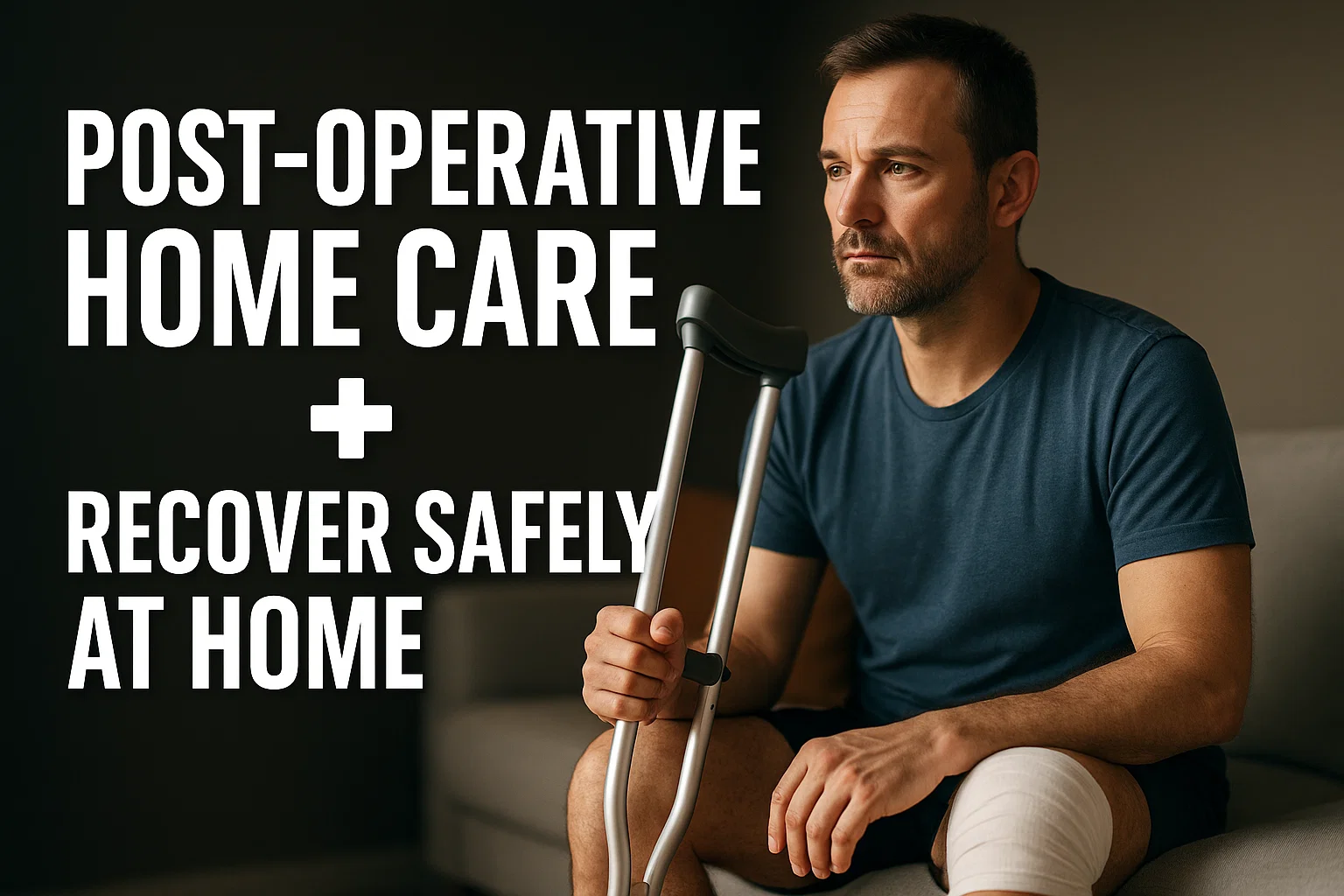What Is Post-Operative Home Care?
Post-operative home care refers to medical and non-medical support provided at home after a surgical procedure. Instead of recovering in a hospital or rehab facility, patients can heal in their own familiar space with the help of trained caregivers or nurses. This approach promotes emotional comfort, reduces infection risk, and often speeds up the healing process.
Who Needs Home Care After Surgery?
Home care after surgery is ideal for:
- Seniors undergoing hip/knee replacement
- Patients recovering from abdominal or heart surgery
- Individuals with limited mobility
- Those with chronic conditions like diabetes that complicate healing
- Anyone who lacks full-time family support during recovery
Whether it’s short-term wound care or long-term rehabilitation, in-home post-surgical support ensures peace of mind and proper healing.
Common Types of Surgeries Requiring Home Recovery
Some surgeries that commonly require home recovery include:
- Joint replacements (hip, knee, shoulder)
- Spinal surgery
- Cardiac bypass or valve procedures
- Hernia repairs
- Hysterectomies
- Cosmetic or reconstructive surgery
- C-section and other childbirth-related surgeries
Preparing for a Safe Recovery at Home

Essentials for Post-Surgery Recovery at Home
Creating a safe and healing-friendly environment is critical. Essentials include:
- A hospital bed or recliner for comfortable positioning
- Raised toilet seats and grab bars
- Medication organizers and timers
- Clean linens and wound care supplies
- Easy access to a bathroom and kitchen
Setting Up the Home for a Safe Healing Environment
A clutter-free space reduces the risk of falls and promotes independence. Clear walkways, remove rugs, install night lights, and arrange essentials within reach.
If the patient lives alone, hiring a caregiver for assistance with meals, bathing, and mobility is often necessary.
Must-Have Supplies and Equipment
- Medical-grade wound care items
- Thermometers and BP monitors
- Mobility aids like walkers or canes
- Shower chairs and hand-held sprayers
- Nutritious pre-prepped meals
- Ice packs and heating pads
Tips for Recovering at Home After Surgery
Managing Pain and Medication
Pain is a natural part of recovery but should be controlled. Follow medication schedules strictly, use natural pain relievers (like heat/ice), and communicate any side effects to your healthcare provider.
Caregivers can help with:
- Timely medication administration
- Monitoring side effects
- Recording pain levels
Mobility and Activity Guidelines
Light movement aids recovery. Depending on the type of surgery, patients should:
- Walk short distances daily
- Avoid climbing stairs initially
- Perform doctor-recommended stretches
Caregivers can assist with mobility exercises and prevent accidents.
Nutrition and Hydration During Recovery
Nutrition fuels healing. A balanced diet rich in:
- Protein (for tissue repair)
- Leafy greens (for inflammation)
- Fluids (to prevent dehydration)
…can make a significant difference.
In-Home Nurse Care After Surgery
Home care professionals often prepare meals according to dietary restrictions and encourage hydration.
When to Consider Hiring an In-Home Nurse
You may need a nurse if:
- The patient has complex medication needs (injections, IV)
- Wounds need professional dressing changes
- Post-surgical complications are a risk
- The patient needs vitals monitored daily
What Services Do In-Home Nurses Provide?
- Administering medications
- Managing wounds and drains
- Monitoring vital signs
- Helping with hygiene tasks
- Educating the family on post-surgery care
Cost and Insurance Considerations
Costs vary based on needs and region. In North Bellmore, NY, private in-home nursing care may range from $35 to $80/hour. Medicare or private insurance may cover some post-acute services, especially if prescribed by a doctor.
Duration and Timeline of Home Recovery
How Long Does Home Care After Surgery Last?
Recovery time depends on:
- Surgery type
- Age and health of the patient
- Presence of complications
Generally:
- Minor surgeries: 1–2 weeks
- Joint replacements: 4–6 weeks
- Heart surgeries: 6–12 weeks
Milestones and Signs of Healing
- Reduced pain and swelling
- Regaining mobility
- No signs of infection (fever, redness, discharge)
- Ability to manage self-care tasks
When to Call the Doctor or Return for Follow-Up
Call your doctor if:
- Pain suddenly worsens
- Wound appears infected
- You experience dizziness, shortness of breath, or confusion
- There’s a change in appetite or alertness
Benefits of Hiring Home Care Post-Surgery

Improved Comfort and Emotional Well-being
Being at home promotes peace, familiarity, and dignity. Patients often feel more in control and supported with one-on-one care.
Reduced Risk of Complications and Readmission
Proper wound care, medication management, and timely interventions by home caregivers lower the risk of infections and hospital readmissions.
Support for Family Caregivers
Family members can rest easier knowing that trained professionals are ensuring their loved one’s safety, while also getting guidance and relief from 24/7 care duties.
Conclusion:
Post-operative home care is not just about physical healing—it’s about returning to life with confidence and comfort. At Precious Pearls Home Health Care, we bring hospital-grade care right to your doorstep in North Bellmore, NY. With compassionate caregivers, personalized plans, and skilled nurses, your recovery is in expert hands.
FAQs
How soon after surgery can home care services begin?
Home care can begin immediately after discharge from the hospital. In many cases, arrangements are made before the surgery to ensure a smooth transition. At Precious Pearls Home Health Care, we coordinate directly with your doctors and discharge planners to ensure caregivers or nurses are ready the moment you’re home.
What kind of caregivers provide post-surgical home care?
Post-operative care can be provided by a range of professionals depending on your needs—Certified Nursing Assistants (CNAs), Home Health Aides (HHAs), or Registered Nurses (RNs) for more advanced medical care. Our team in North Bellmore includes all three, ensuring you receive personalized support tailored to your recovery.
Is in-home care covered by insurance or Medicare after surgery?
Yes, in many cases. Medicare may cover skilled nursing care or physical therapy at home if it’s deemed medically necessary by your doctor. Private insurance plans often provide partial or full coverage as well. We assist all our clients with verifying insurance and exploring coverage options before care begins.






